








THURSDAY 16 MARCH 2023 FROM 18.30





GRAND AUDITORIUM, PALAIS DES FESTIVALS










THURSDAY 16 MARCH 2023 FROM 18.30





GRAND AUDITORIUM, PALAIS DES FESTIVALS



FOLLOWED BY A COCKTAIL RECEPTION OPEN TO ALL PARTICIPANTS
DISCOVER THE MIPIM AWARDS







10 NEWS
Key insights from Cristina Gamboa, Valerie Vaughan-Dick, Isabelle Scemama and Véronique Bédague; serviced living potential; retrofitting for net zero; pricing corrections; partner searches; thematic investment; and the link between sustainability and operational excellence
MIPIM NY:

More about MIPIM’s US debut, coming to the big apple in November 2023
All the session details, expert speakers, conferences and events, to help you plan your time at MIPIM and make the most of the latest research, insights and debate

SPOTTED AT MIPIM
Delegates brought a ray of sunshine into the Palais. Anna-Lena Bergmann (left); Franziska Beck; Svenja Haferkamp; Sina Kuehne; Julia Gebert
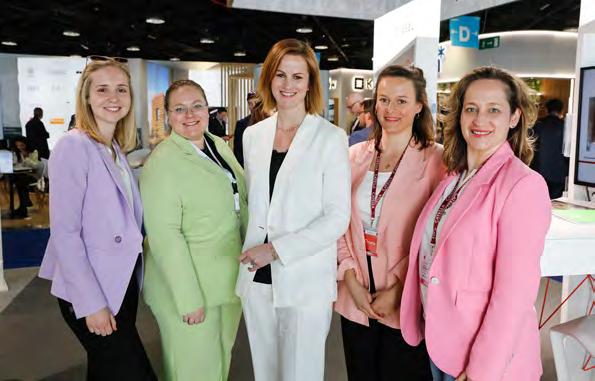
Taille minimale en HAUTEUR s 3
Advertising contact in Cannes Maryam Grandela maryam.grandela@rxglobal.com
RX France, a French joint stock company with a capital of 90,000,000 euros, having its registered offices at 52 Quai de Dion Bouton 92800 Puteaux, France, registered with the Nanterre Trade and Companies Register under n°410 219 364 - VAT number: FR92 410 219 364. Contents © 2023 RX France Market Publications. Printed on PEFC certified paper
The Cannes sunshine made business and networking a pleasure on Day Two of MIPIM 2023



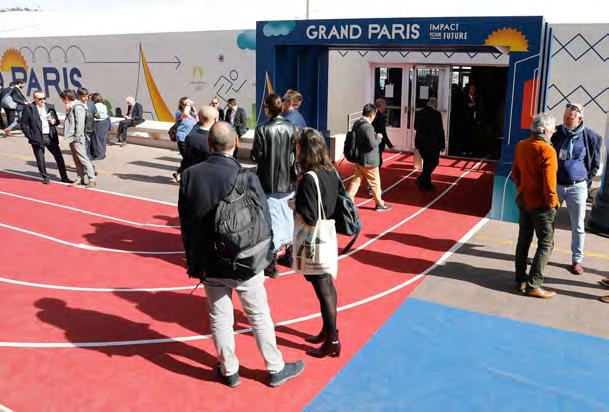
Deals got done in the sun as you chose prime sea-front real estate to discuss the
British exhibitors picked pavilions in the sun to show at MIPIM. Cities and regions included London, Liverpool, Manchester, Belfast, Newcastle, West Midlands, West of England and Central South UK
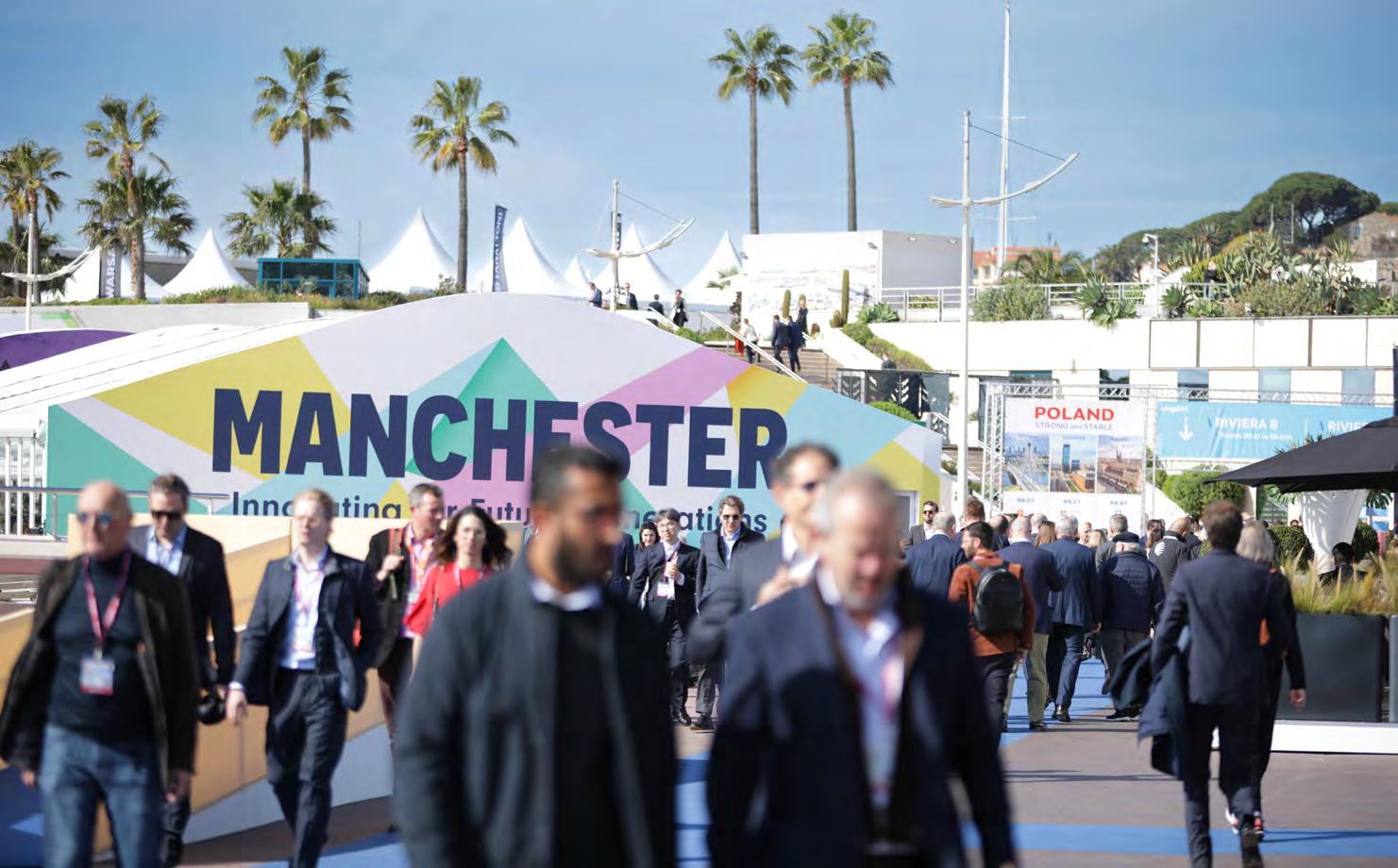
You talked and we listened: there’s something about meeting face-toface that a video conference can’t match
Delegates made the most of every inch of space to catch up, make plans, and discuss development opportunities
Holmströmgruppen’s operations are divided into three areas: ownership and management of properties, project development in the property sector and holdings of private equity companies.
We are a committed and active property owner in selected markets and sees to take initiatives and expand in all business areas when suitable investment opportunities arise. Added value is created through actively and responsibly carrying out the ownership role.
www.holmstromgruppen.se

While you shared your business goals with the the world at
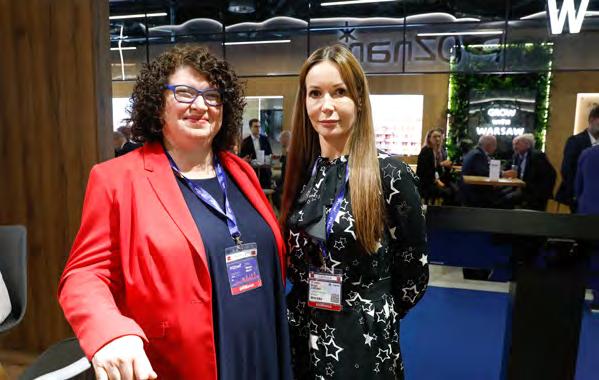


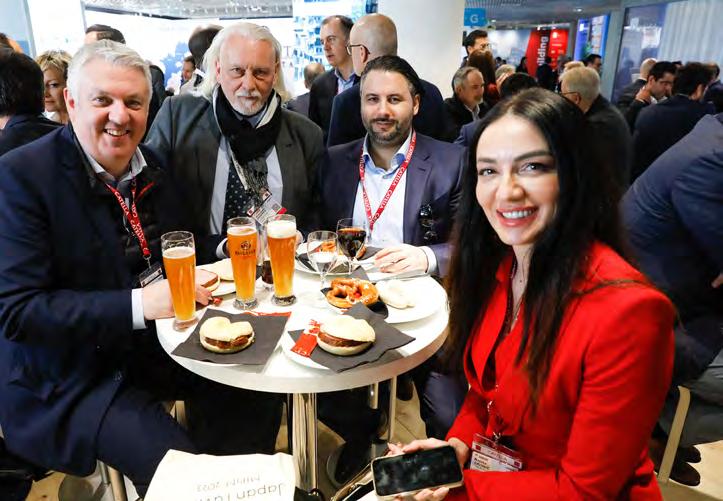
you also took time to show us your stands

11.15 - 13.30, March 16, 2023






Why is France still the most attractive country for FDIs for the 3rd time in a row? What advantages does it have when it comes to seducing and retaining major international entities? And moreover, is there a role to be played by real estate professionals ?

The main metro aeras in France* have gathered some of the most ambitious projects and foreign investments that have captured the attention of the economic world.
Elise Colla - Kadans Science Partner (Netherland) - Paris

Kaori Oda - Horiba (Japan) - Lyon
Pauline Carpentier - Talent Garden (Italy) - Lille


Denis Blanchard - Applied Materials (USA) - Grenoble Alpes


Jean-David Habib - Maison.fr - Homeserve (England) - Aix-Marseille
The conference will be followed by a network cocktail lunch
Moderator
Sarah Russis Kraiem - Public Speaker - FDI Intelligence
Tatweer Misr, a leading real estate developer from Egypt, signed a memorandum of understanding (MoU) with the Saudi Arabian Ministries of Investment & Municipal and Rural Affairs and Housing in the Kingdom, to discuss investment opportunities in the Kingdom, and promote government initiatives that facilitate the procedures of real estate development.
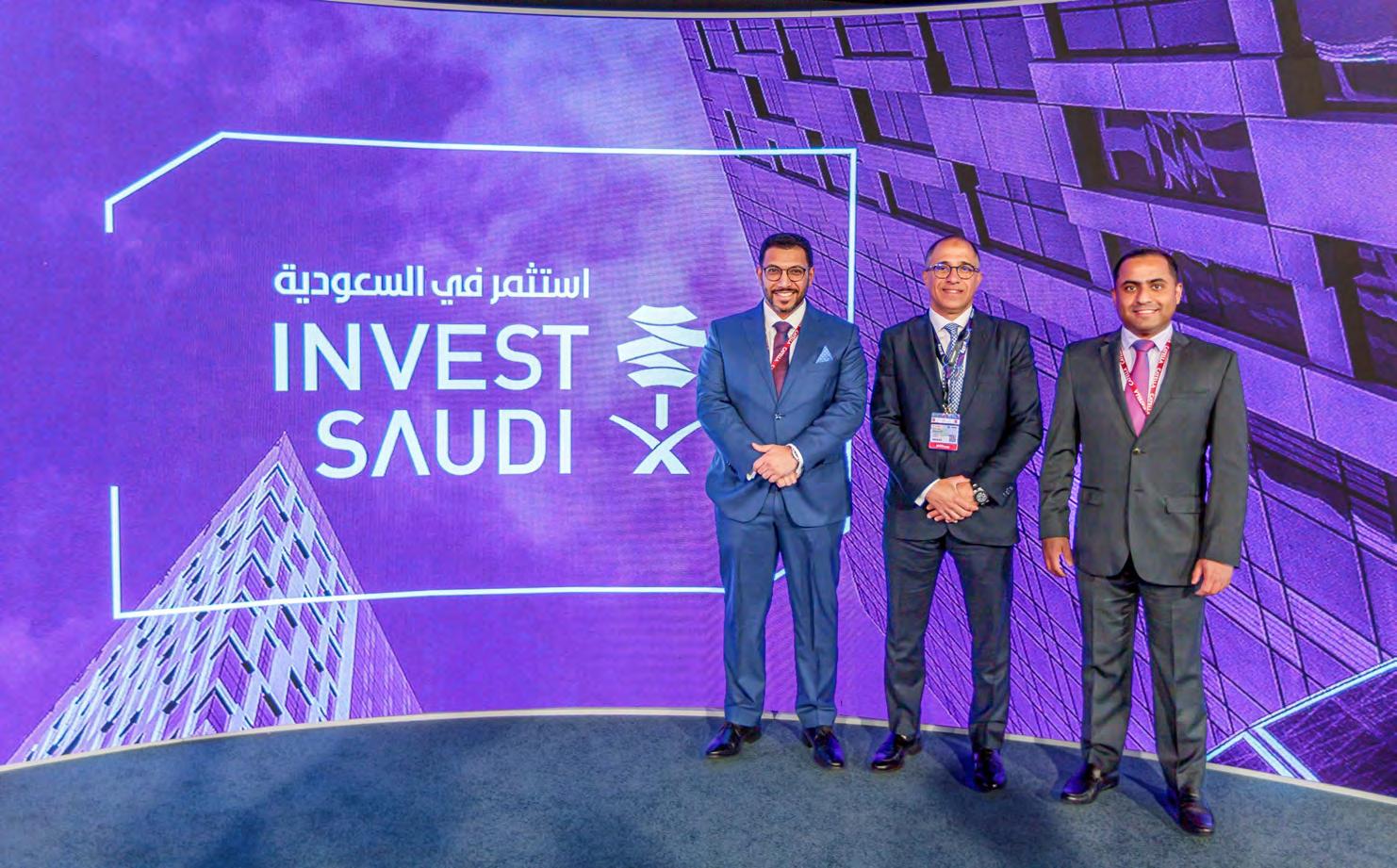
Minister of Investments Development,
A world of opportunities in Brazil was waiting for MIPIM attendees, from ambitious tourism projects to high-profile sustainable plans


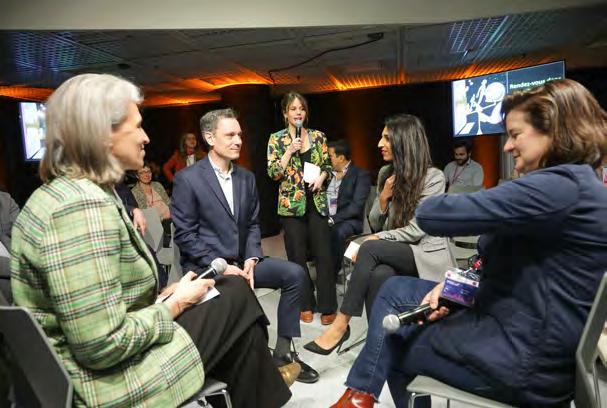
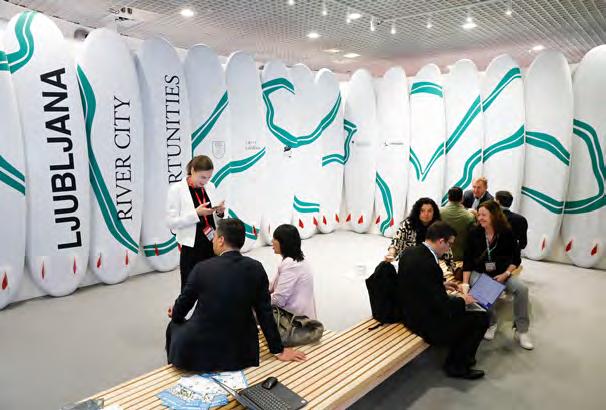 Pictured at MIPIM are: Fahad J Alnaeem, Deputy
Saudi Ministry of Investment (left); Dr Ahmed Shalaby, president and CEO of Tatweer Misr; and Abdulrahman Al-Tawil, Deputy Minister for Real Estate Development, from the Ministry of Municipal, Rural Affairs and Housing.
Pictured at MIPIM are: Fahad J Alnaeem, Deputy
Saudi Ministry of Investment (left); Dr Ahmed Shalaby, president and CEO of Tatweer Misr; and Abdulrahman Al-Tawil, Deputy Minister for Real Estate Development, from the Ministry of Municipal, Rural Affairs and Housing.
The Palais des Festivals was a hive of dealmaking, networking, new connections and insightful sessions

THE CITIES of the future will be “more beautiful and calmer” said Véronique Bédague, CEO of real estate developer Nexity as she outlined her vision for urban centres at the What Cities Of The Future Will Look Like MIPIM session yesterday.
Bédague said that she remained optimistic about the way that cities are likely to develop going forward and stressed that the progress of the past 10 years is a good indicator of how quickly town planning is advancing.
“I feel very passionate when I look at what we have done. This is my passion, to try and change lives,” she said. Nexity is one of France’s largest residential developers, with flagship projects including the development of the Olympic Village for the Paris Games.
Bédague said that it was important to take a pragmatic approach to regeneration and added that the necessary “revolution in the development of the urban environment” was very likely to see densification of domestic dwellings, which would require more residential towers.
However, she said that this must go in tandem with better facilities and amenities close to where people live and with “perfect public spaces” at the heart of communities.
Bédague also stressed the important role of low-carbon homes in future development and said that such buildings and wooden structures provided people with “easier places to live”.
“It is vital that we learn to construct cities in which we can live in harmony,” she said. “And the first thing we have to do is use what is already there, before we build anything new.”
To help drive building innovation, Nexity works with a range of partners, collaborating with local authorities to trial new designs and is constantly testing new building materials and techniques from suppliers.
“It is important that we maintain these relationships. We can work with our suppliers to test and then to test at scale, to help speed up the introduction of new technologies,” she said.
SUSTAINABILITY in real estate has been a major theme at MIPIM, so Isabelle Scemama’s keynote on the Infrastructure Stage — Realising The E In ESG — was a timely intervention. As global head of AXA IM Alts, Scemama is perfectly positioned to comment on the impact of regulation on the sector, and the importance of achieving real change rather than just ticking ESG boxes.
Scemama, who oversees a €183bn business unit, told delegates that part of the problem with realising the E in ESG is establishing areas of responsibility between builders, developers, landlords, tenants and other stakeholders. “But there’s no doubt that regulators are forcing the industry to improve communication and ask the right questions,” she said. “I would add, though, that the goal has to be making buildings more efficient, not just providing data.”

In a similar vein, Scemama said the industry has a responsibility to think about the bigger picture when targeting environmental gains. She cited the example of affordable housing in France,

where a simple way to tell a positive carbon-reduction story would be to shift heating from gas to electricity. However, there may be a better way to achieve energy efficiency via systems involving district heating.
“The key message is that we have to take the responsible decision,” she added. “There’s an innovative district-heating solution in Stockholm, for example.”
Scemama also explored the role of Gen Z in driving the ESG debate. “It’s important for us to attract young talent because it’s an opportunity for them to have a real impact,” she said.
One of the biggest challenges in realising the E is retrofitting buildings. “That’s a challenge for both Europe and the US,” Scemama added. “It’s going to need some rethinking around the way we design cities and, in some markets, that might mean more emphasis on decentralisation and growing smaller cities.”
On a more positive note, she said there is “a strong correlation between the environmental and financial performance of buildings”.
THE CHIEF executive of the World Green Building Council (WGBC) has appealed to companies to pay more than lip service to the social and governance elements of their ESG strategies. In a keynote session entitled Realising The ‘S’ And ‘G’Iin ESG, Cristina Gamboa said it is vital that companies understand the whole life cycle of a building project and its impact on communities at every stage. “For example, for contractors, that’s about making sure there’s no modern slavery in their supply chains and that workers are fairly compensated and reskilled if necessary,” she said. “The green transition agenda requires solidarity and fair pay. With the cost-of-living crisis, there’s also a lot of pressure for companies to make sure that [people have] fair incomes.” And that entails “going beyond the basic law”, she added. It also requires you to give people

a sense “of improvement in life”. Gamboa said it is also important to consider geographical context, because what is needed in terms of welfare will be different in a developing country to a developed one. “There are countries where the workforce may not even know how to read, so how can we help people learn to read and write?,” she added. But good governance and achieving social impact go beyond thinking about the needs of your workforce, Gamboa added: “It’s also about understanding that [projects] transform communities. A project in itself has a huge impact in terms of where it is and how it’s done. If you properly understand the community you’re serving, you can create social value. Maybe you can create a school that you can open up to the community to use on weekends. It’s the people-centric approach that brings success.”
“PEOPLE spend 90% of their time in a building. It is vital that we build structures for the needs of people which are safe, accessible and sustainable.” That was the message from Valerie Vaughan-Dick, the new CEO of the Royal Institute of British Architects.
Her aim, she said, was to create an agile, financially sound RIBA that was values-driven and seen globally as an organisation to work with and listen to.
The driving force for this mood of change can be summed up in one word: Grenfell. The terrible fire which consumed the social-housing tower block in west London in 2017, killing 72 and impacting the lives of thousands more, has cast a pall over the whole housing and construction industry.
She said that there has been some progress in addressing the issues in the Building Safety Act 2022, which RIBA had lobbied for with others, but there were still questions about whether the regulatory framework was sufficient.

Rebuilding trust with the public is a key mission for Vaughan-Dick. Opening up the profession to wid-
er participation is an important part of that. She herself comes from Jamaican background, born and brought up in South London. Her education in inequality came with her father telling her how new Caribbean immigrants were shut out of rental accommodation by racism and had to buy their own homes to establish themselves.
There is a need, she said, to widen the pool of those who design and build housing, with more experience of the lives many people lead. The long training to qualify as an architect meant that many without financial resources were deterred from applying or dropped out of courses. She added that more flexible routes into the profession are needed, such as earn and learn schemes or making more use of apprenticeships.
She said RIBA had been pro-active in tackling climate change, with an important series of documents on sustainability. But she added: “We are calling on the government to embed climate change targets in the building regulations. Not just for new buildings but also for retrofitting existing structures.”
LEADING members of Germany’s real estate profession have gathered in Cannes to discuss the challenges and opportunities within the market.
Among the chief concerns was how the property industry can gear up to better meet its own climate change and ESG goals, with one member of the panel admitting that Germany was behind comparable European countries.
The panel session, Germany: Challenges, Opportunities, Strategies, was held at MIPIM on Tuesday before a busy room of delegates. It was moderated by Nadine Gelke, director of real estate acquisition and sourcing at Barings.
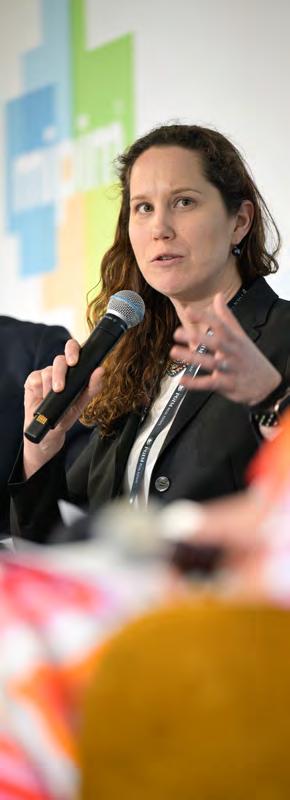
Among those commenting on the many challenges of meeting ESG targets was Christine Fritz executive director and portfolio manager at PGIM Real Estate Germany, who said that the industry was guilty of sometimes “standing in [its] own
way”, especially with regulations.
However she said that, driven by a greater awareness of climate change and events in Ukraine, the German market was making more progress now than in previous periods in which sustainability was taken less seriously.
“There was some question about whether ESG would go the same way it did in 2009,” Fritz said.
“But in fact we’ve realised the opposite is true. We’re hearing that from our investors and our peers in the market.
“One positive to come out of this situation is that ESG has moved forward, and there’s now a consensus that it has to move forward.”
Fritz’s comments were echoed by Uwe Rempis, fund manager of LaSalle E-REGI, part of LaSalle Investment Management. He said that after the global financial crisis of 2009 “ESG slowly disappeared” from the industry’s radar.
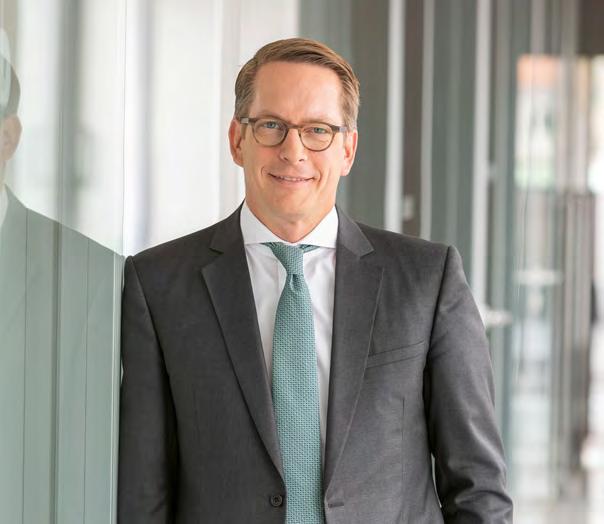
“It’s definitely a challenge,” he added. “It’s a journey.”
Fellow panellist, Mayor of the City of Hannover Belit Onay, said that his city was “transforming completely” through a series of ESG-motivated initiatives, but said that more needed to be done, including by the private sector. He said: “We have to prepare ourselves with strategies for climate change, heatwaves every summer, housing more and more people coming into our cities.
“The strategy we have found in Hanover is that we are trying to transform the mobility in the city, bringing in more public transport, more bicycle lanes.
“There’s a challenge for a city to find new spaces where we can create more social areas and greener areas. We need more support from investors who want to be part of the strategy in creating new cities.”
MIPIM will not be a great kick start to the market as in previous years, Philipp Schaper, CEO of European real estate for leading German fund manager Patrizia, said. “The market and activity is still too unbalanced. The issue of who should move first, buyers or sellers, is not resolved.”
Patrizia itself has been preparing for the new market phase by expanding outside Europe, and by acquiring companies in expanding sectors.
According to its preliminary financial results at the end of last month, 11% of assets under management (AUM) are now outside of Europe, while the share of AUM in Germany fell from 60% to 52%. Total
AUM grew strongly from €48.6bn to €52.1bn in 2022.
Patrizia’s acquisition of Whitehelm Capital has given the company a foothold in the infrastructure sector. “We carefully looked around and found the perfect partner. It is a great fit,” Schaper said.
Patrizia is particularly looking at infrastructure in Asia, notably Japan. “With infrastructure in Asia it is easier to get double-digit growth than in Germany,” he added.
Patrizia is also hoping to benefit from investing in sustainability. “Banks are now putting complete focus on ESG compliance when investing. They are looking at business plans in such detail that we haven’t seen before,” he said.
Our global exhibitions – in Europe, Asia and the US –are catalysts for concrete solutions:
MIPIM
12-15 March 2024 / Pre-opening 11 March Cannes
The point of reference to gain access to global capital sources and the most exciting development projects in the world.
MIPIM NY
29-30 November 2023, New York City
A new event in New York to address all the transformation levers for the real estate industry.
MIPIM ASIA SUMMIT
5-6 December 2023
Hong Kong
The property’s leaders’ summit in Asia Pacific dedicated to inbound and outbound investment & regional development.
www.mipim.com
We connect and inspire the world’s powerful voices of the built environment to create more sustainable, liveable and prosperous places for all.
SYLVAIN Giguère, chief economist and head of economic development at Montreal Metropolitan Community, has an enviable problem, with employment growing at 4% and an availability rate for industrial buildings of just 1% within the Community area.
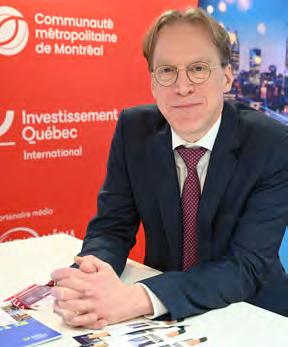
The planning authority for greater Montreal accounts for almost half of Quebec’s economy and half of the province’s population. The pressing need is to optimise the use of the existing business parks and industrial sites in order to host new business and investment.
“We have a plan to transform our commercial estate, optimising and intensifying our business parks and modernising buildings that do not comply with current ecological standards,” Giguère said. Each of the Community’s 14 sub-regions will be tasked with drawing up a plan, budget and timetable for the transformation of their areas by the end of 2024. The Community will channel finance for the planning work to the different areas, with implementation expected to be through public-private partnerships.
THE ECONOMIC outlook for real estate contains major areas of uncertainty driven by ongoing increases in interest rates and the lack of debt and equity capital available.
This is resulting in low liquidity, concerns about the refinancing of existing loans and a wait-and-see approach across the industry.
Those are the key themes identified by the latest iteration of the Urban Land Institute (ULI) and PwC’s Emerging Trends in Real Estate (ETRE) Global Outlook report, which was launched at MIPIM yesterday.
According to the report, the key question is whether rental growth can be delivered against a background of stagnant economies, declining consumer sentiment, ongoing structural change and increasing capex requirements.
The biggest obstacle to getting deals done in 2023, the report says, is uncertainty over where and when interest rates will settle, following which more clarity will appear on
real estate pricing. With the general expectation that interest rates will stay higher for longer, the current price discovery challenge is exacerbated by low investment volumes
and low liquidity, it says.
“Real estate leaders are adjusting to interest rates that are expected to stay higher for longer and getting to grips with a new normal of higher finance costs and minimal capital growth,” said ULI Europe CEO Lisette van Doorn. “The keys to success — operational management and rental growth — depend on making assets fit for purpose and ESG compliant.”
She added: “The industry can no longer wait and see, hoping that construction and financing costs will decrease, as occupiers will critically review their total occupancy costs at lease renewal, and alignment with their space and ESG strategies is key. A failure to act may imply loss of rental income very soon.”
Gareth Lewis, ETRE leader and a director at PwC, said: “The slow speed with which real estate is revalued relative to equities and bonds is causing a problem for institutional investors, especially in the US, Europe and Australia.”
EUROPEAN markets that have repriced quickly are best positioned to benefit from significant dry-powder capital. However, the latest banking shock wave following the collapse of California-based Silicon Valley Bank (SVB) might prompt another short investment pause, said Amsterdam-based CBRE divisional president Marco Hekman. The UK, the Netherlands, Germany and Sweden are among the markets to have been fastest to correct, with pricing off around 20%-30% from their peak in broad terms across asset classes. That has left them well positioned for investment, Hekman said, with a number of institutions refocusing on real estate once again. This comes after a decline in capital markets, as interest rates rose and banks
backed away from property. Despite the situation with SVB, Hekman remains positive: “It’s not just about taking the pain [in valuations], it’s about the truth. But I remain optimistic about a number of sectors. I think that operational real estate — including data centres, hotels and holiday parks — is performing well. And I also think there is more interest in retail again.”
In terms of the latter, Hekman said that shopping centres and retail parks have mostly gone through the challenges of retail tenant failures and the rise in online retailing, both of which have largely flatlined, meaning that values and performance have stabilised. Hekman also believes commercial real estate will hold up better in Europe than it has in the US,

observing that there has been a stronger return to work across European markets than there has been in North America.
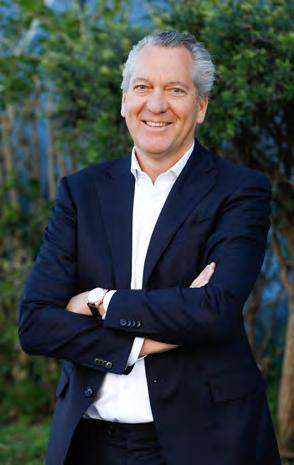
Info en continu, interviews exclusives, décryptages, nouveaux formats...

Tout pour faire Le Point
Vous pouvez retrouver tous nos contenus sur :
Le site Internet Le Point wwww.lepoint.fr


L’application Le Point



THE ITALIAN region of Emilia Romagna is on a drive to attract investment with a particular focus on future-tech and big-data projects.
Vincenzo Colla, regional councillor with responsibility for economic development and green economy, work, training and international relations, is in Cannes to showcase his region, and talk to investors and developers about opportunities. He is highlighting a number of projects centred around Emilia Romagna’s reputation as an ancient centre of learning, as well as future growth plans entailing digital, sustainable and knowledge-based developments.

Emilia Romagna counts seven higher education centres, including what is claimed to be the world’s oldest university, Alma Mater, in Bologna. Also there are plans to stimulate Ravenna’s potential as a major Mediterranean port, including a 163,000 sq m mixed-use industrial-led project in Darsena District. The regional delegation is made up of representatives from the Bologna Metropolitan Area and the municipalities of Piacenza, Ravenna and Reggio Emilia.
THERE is “an 800lb gorilla” looming over the recovery in the US real estate market: the office sector. Footfall and other data indicate that only 50% of office workers have returned to work full time, Blackstone’s Michael Lascher told the Trends In US Real Estate Capital Markets conference.
“It’s so nice to be here in Europe, where everyone seems to be back to work and city centres are busy every day. In the US, cities are busy Tuesday to Thursday but, Mondays and Fridays, they’re often empty,” he said. Although all the panel were broadly happy with the response to the collapse of Silicon Valley Bank, Lascher added: “If the economy is stalling, a walk back into the office is more likely, which will help the problem.”
David Bouton of Citigroup Global Markets noted that “not all offices are equal”. He said: “Part of the story is the functional obsolescence of lots of office space. Older class-B offices find it harder to attract people back. But new
bright, open, well-located class-A offices with lots of features and facilities are making record rents.”
Looking at other sectors, Bradley Weismiller of Brookfield Asset Management said that the industrial sector was still positive and would survive higher interest rates as long as cash flow and rental growth could be maintained. There was positive news from the panel on hospitality, with China opening up again, and a more optimistic outlook for retail.
Kwasi Benneh of Morgan Stanley said that other, more esoteric asset classes would continue to be of some interest while the market was still not fully restored. “Banks can easily underwrite the cash flow of golf courses, self-storage, gas stations, parking lots and similar,” he said. Housing was seen as a sector with huge potential. Lascher said Blackstone was buying UK social-housing developments. “There is pressure to make sure there is enough affordable housing. But whether it’s affordable or market rent, we need a lot more.”

HUNGARY remains a dependable partner for investors into Central and Eastern Europe despite the geopolitical issues arising from Russia’s invasion of Ukraine last year, according to Georges Habsbourg-Lorraine, Hungarian ambassador to France.
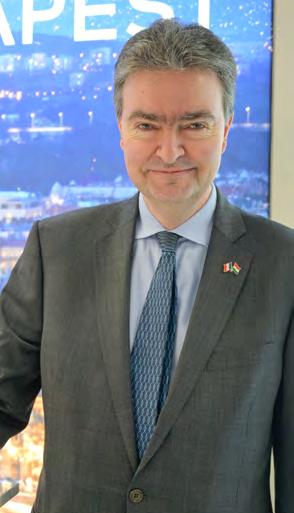
Speaking at the Budapest stand, Habsbourg-Lorraine said: “Hungary is a reliable partner in Central Europe, which has been developing very positively economically from many different points of view over recent years.
It is in a beautiful position in the heart of Europe, which can be sometimes complicated, as it is for the moment. But for all the difficulties, Hungary has devel-
oped in a steady way and has the capacity to show good results in many different sectors.”
Habsbourg-Lorraine added: “We can show a really long list — not only in real estate but in many different fields — of foreign investors [that have] shown their commitment and their confidence in the country.”
Habsbourg-Lorraine noted that this is particularly the case when it comes to development — a capability that was recognised in 2022 when Hungary won the MIPIM Special Jury Award for Budapest’s House of Music. “We were very honoured last year that one of our really very nice projects won that award,” he added.
• Businessimmo.eu
• Bi Premium articles
• Business Immo Global Magazine digital and print


• Breaking news 15 minutes before everyone else
• Business Immo directory
• Discount on selected events and trainings
• Transactions

Our products and solutions provide you with comprehensive commercial real estate intelligence
Cloudbrixx is at MIPIM this week looking for new clients and talking to potential investors about its plans for international rollout. The company, which provides a cloud-based data management solution for the construction and real estate industry, said its key USP is that it provides an end-to-end software solution covering the entire property life cycle from planning and construction to building operation and management. Cloudbrixx managing partner Marc Mockwitz told MIPIM News that the company is wellplaced despite the current challenges facing the sector. “Companies need to find efficiencies to counter the impact of high interest rates and inflation. Our software solution is very efficient and has been proven to save money for our clients.”
In an ideal scenario, said Mock-
witz, Cloudbrixx will start working with clients during construction and maintain a relationship with the client through the life cycle of the buildings in question. On proptech trends, Mockwitz said: “There is cash for tech investments, but investors are looking more closely at business models.”
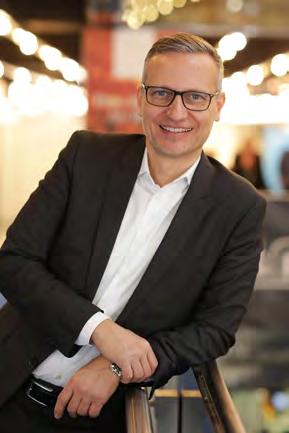
REAL estate owners and managers must focus on sustainability, operational excellence and finding new solutions in management and investment, to keep pace with changing market dynamics, according to Sophie van Oosterom global head of real estate at Schroders Capital.

“Sustainability and operational excellence are often quoted separately, but in practice are heavily interlinked at asset level,” she said. “By its physical nature, real estate affords investors the ability to adapt and reposition assets for the modern world, to ensure they can be operated efficiently. This means running the assets to minimise use of scarce resources while contributing positively to business models of tenants and the wellbeing of the ultimate occupiers.”
This approach may require additional services, more intense management on the ground and/ or additional capital expenditure
“IN PORTO we are targeting carbon neutrality by 2030, and we see that real estate investors are really on board with goals like this,” said Rui Moreira, Mayor of Porto. “We have been making a climate pact with museums, with

transport, with households, to create a sustainable future. It has proved a kind of social movement, where everyone brings suggestions and there is a common drive to make things right.”
Three mayors from the Greater Porto region are at MIPIM to promote opportunities in the vibrant cities of northern Portugal. Representing Porto, Matosinhos and Gaia, the city leaders are showing how investors can get involved in the area’s green ambitions.
“Across Greater Porto, people often live in one city and work in another so we have shared goals,” Moreira said.
“We recently completed the sustainable transformation of our historic Mercado do Bolhao in the heart of Porto which has breathed new life into the city,” he added.
to transition the assets to become more energy efficient, she noted. “However, only when these elements are integrated, can the long-term relevance of the assets be secured for occupiers and can occupiers’ business models thrive.”
CROMWELL Property Group has €7.6bn in assets under management across 12 territories. Deciding how to add to that portfolio involves careful analysis of big shifts in society, according to head of research and investment strategy Tom Duncan: “We’re thematic investors. We identify the big themes in society and try to work out what that means for real estate. We believe this mindset allows us to get ahead of the market because we have a good grasp of what is coming down the line.”
Duncan’s four overarching themes are technology, demographics, environment and geopolitics. While all four are having an impact of Cromwell’s
investment decisions, he said: “Environment is especially critical right now. We believe it will be a key factor in all real estate valuation in the coming years. Our advice is to get out ahead of the pack because you’ll be a force for good in the industry and benefit from a strong financial performance.”
Duncan is particularly interested in the youth demographic: “Gen Z is experiencing the world in a completely different way to any previous generation. They want different things in terms of how they work and live. That will drive important new trends in terms of office and residential dynamics.”




















































































PROFESSOR Katherine Richardson, from Copenhagen University’s Sustainability Science centre, called on the real estate industry to take a stand in delivering on sustainable goals with real action in order to reduce environmental impact. She said that partnerships within the building industry were a key route to achieving this.
Speaking via livestream at a Danish Solutions conference event at MIPIM on how to contribute to the green transition worldwide, she urged delegates to think carefully. “If we don’t crack the climate and biodiversity crisis we won’t have a future, let alone a sustainable future,” she said.
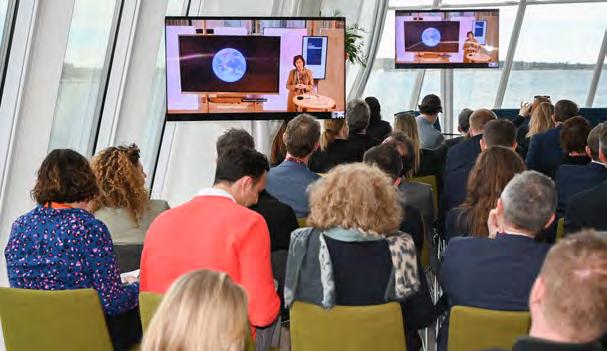
“What is our relationship with the planet at the moment?” she asked. “There is no umbilical cord. It means firstly when we’ve used the earth’s resources we aren’t going to get anymore. Secondly, we can’t get rid of our waste. Climate change is a waste problem.”
“We’ve been working on climate for a really long time but the year that man released the most emis-
sions was 2022 and before that it was 2021. We haven’t even started to level emissions off — they are still increasing.”
Action must be taken, she said.
“This is a zero-sum game. The trick is we need to bend the curve and we have four different levers to do this — technology, the government system, the economic system and our individual and collective behaviours need to change.”
“It’s clear that we all have a responsibility for delivering this pur-
chase order from the future but it’s companies that have the biggest responsibility,” she said. “It’s companies that are sitting with the levers that control how much we are taking out and how much we are putting in.”
Other speakers at the conference session included Susan Jayne Carruth Thams, architect and partner at GXN; Jack Renteria, director of living concepts at Alfa Development and Ritu Jain, co-founder and CPO at LifeX.
BOLOGNA offers one of the key investment opportunities in Italy, according to Matteo Lepore, the city’s Mayor. “Bologna now is one of the best destinations for investment in Italy. It’s one of the most innovative but also the safest place to invest in Italy,” he said.
“As Mayor I want to push an agenda dedicated to climate justice, innovations and social inclusion.”
One of the most important of several investment projects for the metropolitan area is the Big Data Technopole, which hosts some of the most powerful high-performance computers in the world.
“We have here 20% of the computing capacity of Europe and 90% of the country,” he said. “That posi-
tions Bologna as one of the most important cities for data and computing.”
Lepore said the city has attracted more than €8.5bn of private and public investment over the next five years for infrastructure, local transport, energy, public schools and homes.
One such project will see a €500m investment in the first of five new lines of electric trams in Bologna. “That will change our local transport strategic plan and will connect the city centre with the most important areas of the city.”
Bologna also has several projects focussed on social and student housing, as well as a masterplan for a new entertainment area.
POLAND is the focus of expansion for Trei, the real estate arm of German retail group Tengelmann. Set up in 2008, Trei has mainly funded development in-house, but for its future expansion it is now looking for joint-venture partners, Trei CEO Pepijn Morshuis said.
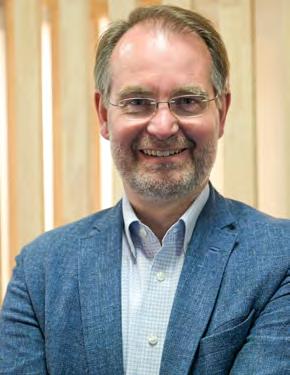
One of the company’s main areas of operation has been retail parks, and it already has a joint venture in the sector in Poland with London-based Patron Capital. It is now eyeing up the residential sector in Poland. Morshuis pointed out that the institutional-quality rental sector is very small. Ironically, most people in the former communist countries owned their own homes. That is still the case for 85% of the Polish market, he said. But there is a growing demand for quality rental properties. With only around 8,000 quality rental properties in the country and only 12,000 under construction, there is a huge pent-up demand. This has been boosted by the influx of Ukrainians fleeing the war, many of whom will stay long-term, Morshuis believes.



Nous vous mettons en relation avec des experts de l’immobilier de prestige pour réaliser la plus juste estimation de vos biens.








EASE of investment and a proven market are among the many reasons to look at Greece as an investment opportunity, according to Marinos Giannopoulos, CEO of Enterprise Greece, the official agency for investment and trade in Greece which works to promote exports and attract investments into the country.
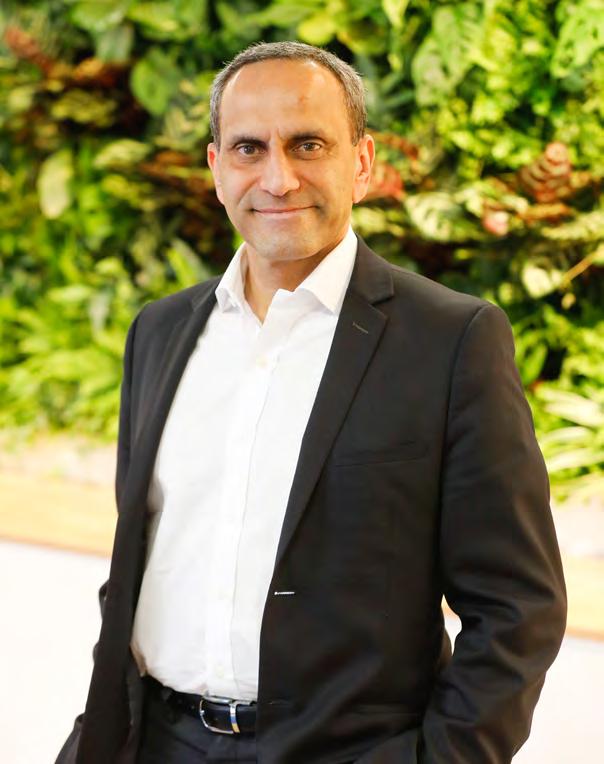
“We are the success story of the eurozone,” he said. “There are so many opportunities right now because we are a growing economy, so the returns that investors can get from coming to Greece can hopefully surpass that of other countries in the EU.”
But he said the country wasn’t complacent about its position and that Enterprise Greece worked hard as a facilitation agency to offer a concierge service for potential clients and investors to help them expand in Greece. That includes a one-stop shop for information, consulting and assistance through each phase of an investment project. “We want to bring as many companies as we can under our wings and to Greece,” he said. However, he said, the country con-
tinued to do more. “Being a success story isn’t enough and we strive to constantly implement new measures to attract investors. Speaking of Greece’s historical economic situation he added: “It has been tough but now it’s a completely different story and we want investors to know that we are here for their needs and that now is the time”.
He said that Greece had proved its economic recovery over the last three years or so, delivering record after record — for example attracting €6bn in FDI in 2022. Greece is aiming to broaden its appeal as a year-round destination and is thinking long term, putting the infrastructure in place to manage that goal.
Giannopoulos pointed out that Greece offers a variety of enablers for investment, including a strategic investment law which allows a fasttrack process of 45 days, as well as a specific set of incentives for investors, including tax breaks. “We are the success story but we are looking ahead to the future for greater investment opportunities,” he said.
LONDON-based real estate fund and asset manager Resolution Property is on the hunt for third-party equity partners to work with it on its strategy of key secured transactions in the office and hospitality market over the next three to six months in the UK and Europe, according to CEO Biren Amin.
“Traditionally we’ve not done that,” he said. “We want to use strategic investors aligned with our money to develop co-owned funds in the future,” he said. “We will always be in for 20% to 50% but are looking for joint-venture deals.”
Resolution Property has been in business for 25 years, during which time it has invested and divested over €5bn of real estate. The company is owned by Chinese conglomerate Fosun.
A prime focus is on repositioning the London office market with Resolution Property having
bought and sold a number of iconic offices, including the Alphabeta building in Finsbury Square.
“We are at MIPIM to look for opportunities in London offices and hospitality and to speak to a number of strategic equity partners to see if there is an appetite to come in on opportunities with us in London and further afield in Europe,” said Amin.
The office market offers particular opportunities at the moment with investment units moving out, he said. “There is a definite market sentiment that sellers will be much more accepting of prices and we will see a lot more investment activity and deals being executed but only by people that can underwrite these transactions,” he added. “We’re seeing some very good opportunities to buy at discount and believe it’s the time to buy, rather than to sell.”
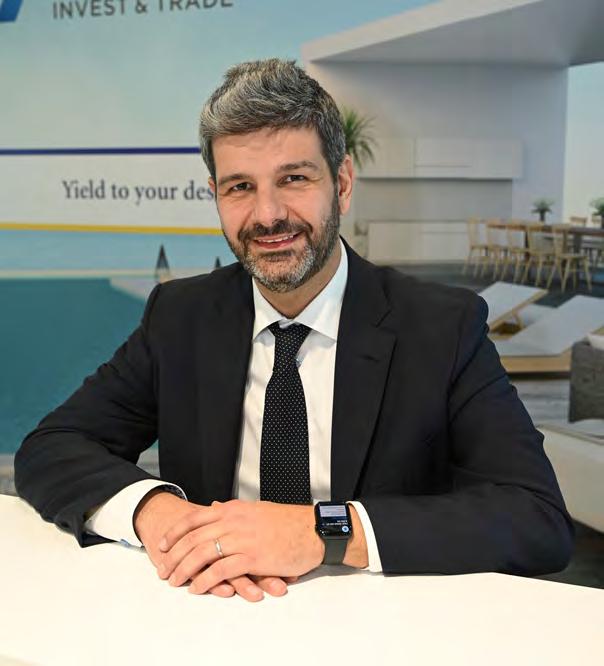


AN ECLECTIC line-up of international real estate experts gathered at MIPIM on Tuesday afternoon to share insights into the evolution of urban living. The panel discussion, Revolutionary Infrastructure To Help Realise Tomorrow’s Cities, took place on the Infrastructure Stage.

Andy Street, mayor of UK region the West Midlands, said his threecity conurbation had focused a lot of energy and investment in transport infrastructure. He said a top priority is continuing to state the case for high-speed rail link HS2: “It’s critical that we have a highspeed link to London and the North, so it is important that we don’t lose our nerve.”
David Grover, CEO of Saudi Arabia’s largest real estate developer Roshn Group, said his company is embarking on a series of related projects including the construction of 3 million homes, 2,400 schools and an airport in Jeddah that will be four times bigger than Heathrow. “The work we are doing will create 100,000 jobs and add billions to the
Saudi economy. It will also change the dynamic of the way people live, work and socialise in the Kingdom.”
Jeanette Hansen, CEO and senior partner of architectural firm 3XN, discussed her firm’s recent work on the Quay Quarter Tower in Sydney, Australia. She said: “There is a big debate around the 15-minute city, the idea that residential, work, education and leisure should be close to each other. I also think it is important to explore new opportunities that emerge. If a new metro is constructed, does that mean an old
railway line can be converted into a safe green corridor?”

Michael Dobler, head of Schindler global account management at the Swiss firm, said the question of urban regeneration is crucial, with seven out of 10 people expected to be living in cities by 2050: “There is a huge opportunity to transform existing buildings to fulfil future needs. This is particularly true now that COVID has changed the way many office buildings in cities are used. Why not add residential and hotels to unoccupied buildings?”
SWISS Life Asset Managers is “fully advanced” in its commitment to ESG-driven changes, with a plan to
reduce the overall carbon footprint of its portfolio by 20%, the head of the firm’s real estate division has said. Speaking to MIPIM News, Fabrice Lombardo, head of real estate at Swiss Life, said: “We are in the full process of bringing down our carbon footprint.”
Lombardo added that Swiss Life had been committed to the reduction of its carbon footprint for a long time, and that the impetus for the strategy had come internally rather than being imposed from the outside.
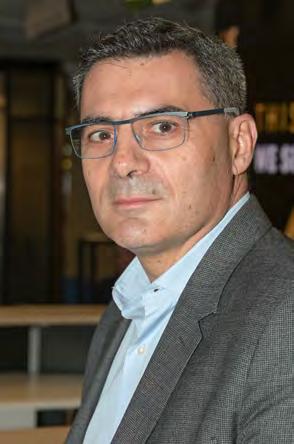
“We have never relied on regulations,” he said. “We have always been among the leaders of this topic. We started 12 years ago, and a long time ago we did our own internal rating of our assets.
“It’s always been our own convic-
tions. It’s in our DNA.”
He added that disposal of existing assets that were difficult to retrofit to modern ESG standards was not being considered, with the company preferring to focus on “making improvements to our existing stock”. “Our goal is to make our assets perform better. That’s always been our desire.”
Swiss Life remains focused on acquiring office assets in prime locations, as well as pressing ahead with an agenda of acquiring alternative assets including healthcare-related properties such as nursing homes, rehabilitation centres and senior housing.
Lombardo said that such assets were proving to be “resilient” in the current market.
DAIWA House Group is to open a modular housing factory via its subsidiary Daiwa House Modular Europe in Germany in order to facilitate its growing business in Europe.
Nobuya Ichiki, director and managing executive officer at Daiwa House Group, explained that the company already has a factory outside Amsterdam in the Netherlands, where it is currently most active. He said that the company is now looking to develop its business elsewhere in Europe, and in Germany and the UK in particular. Most recently, Daiwa was commissioned to build new earthquakeresistant homes in the Loppersum and Wirdum earthquake zone in the north of the province of Groningen, Netherlands, by the National Coordinator of Groningen.
“Despite their temporary nature, these homes have the quality of permanent homes and are built to provide comfortable and safe living,” Ichiki said, adding that providing quality temporary accommodation is vital given that it can take a long time for homes to be reinforced.

OlivierLaporta Nouveauvenudanslasphèreimmobilièreen Belgique,OlivierLaportavientd’êtrenommé CEOduréseaud’agencesCentury21>P.2



























LEBIEND’EXCEPTION ULTRAUNESPECTACULAIREVILLA CONTEMPORAINE













THE LOGISTICS market is in good shape, despite the strong headwinds currently being experienced across Europe’s major economies, according to Rory Buck, managing director of Clarion Partners Europe.
“There’s an interesting dynamic whereby the investment market is having to adapt to changes in interest rates and rising inflation, but the underlying fundamentals of logistics are still very strong,” he said. “Vacancies are low and tenant demand is robust.”
A big part of this is due to the boom in ecommerce, which has led to a growing need for warehouses close to customer conurbations. “But the traditional industrial and manufacturing base is also robust,” Buck said. “Companies have had to recalibrate their supply changes, which has led to more near-shoring and redundancy protection. So even in the face of so much economic uncertainty, we are seeing increased demand.”
One key consideration for the logistics sector is the growing shift towards environmental sustainability. “I think logistics is improving dramatically on ESG,” Buck said. “We are very focused on making sure our buildings are sustainable, not just in construction but also during operation. I think it makes sense to invest in buildings with ESG credentials, because they attract companies that have strong
corporate ethics in this area.”
In terms of his MIPIM priorities, Buck said: “We cover all of Europe, so the market is a good place to meet with partners, understand what other people are thinking and look for opportunities. Like a lot of people, we’re interested in logistics sites that have good transportation lines and access to key population centres.”
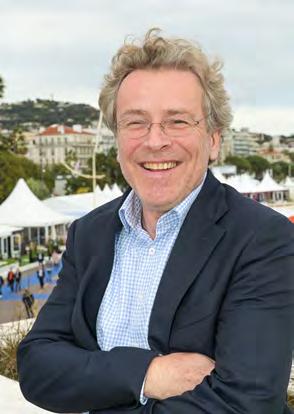
THE SERVICED-living sector is set to become “bigger than the hotel sector”, said Michael Widmann, global CEO of PKF hospitality

group, which provides critical advice to investors and developers in the hotel, tourism, leisure and serviced-living sectors.
Widmann added: “I’ve been with the company for 35 years and I’ve never seen such a profound trend as serviced living. This crossover between residential and hospitality is set to grow and grow.”
Looking at other key trends, Widmann said that the hospitality sector has proved remarkably resilient to the impact of COVID. “I don’t see any evidence that it’s having an impact on investment,” he said. “At the same time, consumers are keen to make plans for fear that travel opportunities might be taken away from them again.”
Aside from the shift towards ser-
viced living, Widmann identified two other key developments confronting hospitality investors: “We’re seeing a shift in interest from city to resort properties, with Portugal, Spain, Greece, Italy and Croatia increasingly sought after. We’re also seeing increased demand from consumers for quirky individualistic hotels rather than big 400room box hotels.”
A regular MIPIM attendee, PKF is hosting a project showcase presenting 20 of the most interesting hospitality developments from around the world. “The showcase is a great opportunity to bring operators, developers and investors together,” Widmann said. “MIPIM is a great place for networking and our showcase allows us to connect the dots.”
THE REVIVAL of the bond market as interest rates rise to counter inflation plus continuing ESG sustainability requirements pose serious challenges to the real estate market in 2023, according to Kurt Jovy, head of real estate product management at Luxembourg fund service platform Universal Investment.
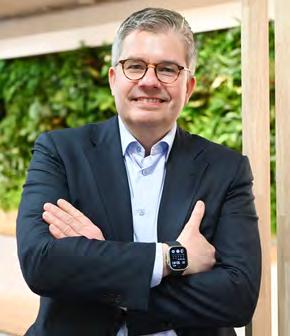
“The real estate market has had 10 years of very positive growth, but now there is an alternative for investors in bonds, which are very secure and less effort,” he said. “The days of buying a property and selling it after two years at a higher price are gone.” The challenges will put a premium on competence and professionalism, Jovy added: “Only the best asset managers will survive.”
Universal Investment provides administration mainly for institutional funds, with more than €26bn under management. To prepare the company for the new climate, it has been strengthening its teams by recruiting experienced staff and attracting young talent with a new real-estate trainee programme.
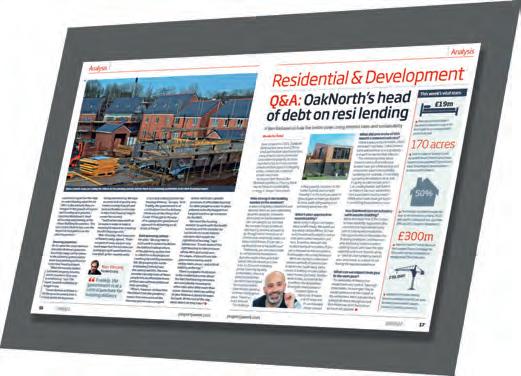


THE OUTLOOK for London’s future growth and status as a “safe haven for global capital” is as strong as ever, according to the head of an Australian superannuation fund’s UK-based property portfolio.
Victoria Stanley, investment director at Melbourne-based pension fund AustralianSuper, said that a combination of a “deep pool of talent” in the London workforce, the completion of major infrastructure projects and a return in confidence among real estate players has contributed to the city’s strong return since the pandemic.
Stanley was addressing delegates at the London stand, who had gathered to hear her keynote speech on investing in the UK capital.

“Investor confidence was at a low ebb, but there’s new certainty about the macro-economic picture,” she said. “London pricing remains attractive relative to other European markets. There’s still demand for the best quality stock. And London has proved more resilient to the work-from-home change than other global cities like
New York. When we look back in a few years, I think 2023 will look like a vintage year for capital in central London. We think these trends are going to continue. London is still our number-one European city for investment.”
AustralianSuper is a global multi-asset pension fund, 6% of which is comprised of real estate. The firm’s London division manages a property portfolio of around £9bn (€10.2bn) in Europe, including a 50% stake in 53-acre (21.4 ha) mixed-use regeneration project, the Canada Water Masterplan, which it acquired last year as part of a joint-venture partnership with British Land.
That deal followed an earlier acquisition in urban regeneration project King’s Cross Estate. AustralianSuper currently holds a 70% stake in the King’s Cross project. Stanley cited the completion of the new Elizabeth Line on the London Underground as a positive step forward — and one that has “expanded London’s potential for growth”.
THE INTRODUCTION of minimum energy-efficiency standards in some territories has been vital to driving behaviour change among lenders and investors, according Peter Cosmetatos, chief executive of CREFC Europe, the trade association for the European real estate finance market.
Speaking at Prologis’ Financing ESG Impact Projects panel, Cosmetatos said that minimum standards, as seen in the UK and Netherlands and soon to be rolled out across the EU, had proved to be an effective motivator for financiers.
“The very obvious factor that has made ESG relevant for lenders is minimum energy-efficiency standards,” he said. “I think that’s been very clear because, if people know that assets are no longer lettable from a certain date if they don’t meet a certain standard, they know that it will have a material and extreme impact on the value [of properties] and on their ability to
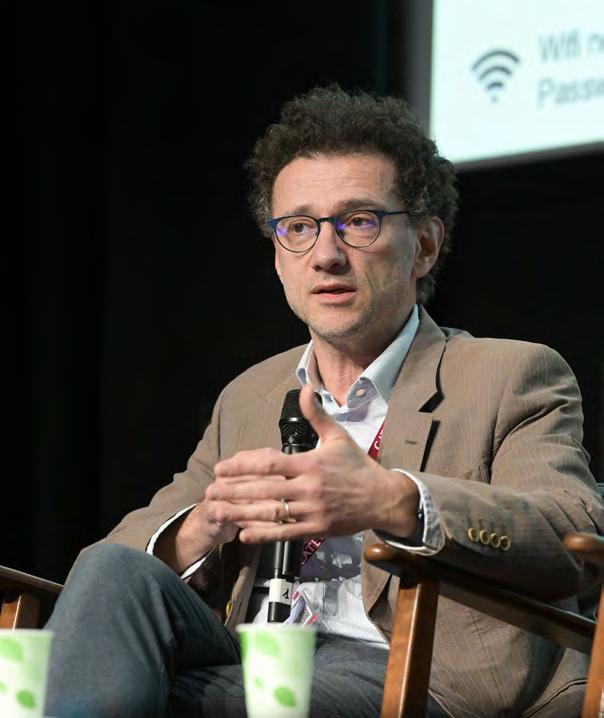
get their capital back.”
Richard Craddock, LaSalle’s managing director, debt investments, agreed, but added that self-interest wasn’t the only factor driving environmental awareness: “I think there came a point where it was no longer enough for lenders to just say, ‘Well, we’re one step removed from the asset, we don’t control the asset and therefore we don’t have any direct control over driving the ESG agenda’. I think that narrative has now changed and lenders realise that there is collective responsibility.”
Indeed, lenders may have a key role to play in helping their clients to renovate inefficient assets.
“You’ve got this long brown tail of real estate owners who don’t have sustainability teams and don’t have strategies to get to net zero,” Cosmetatos said. “What they’re going to need is a bundle of advice and finance from their lenders to help them improve their buildings.”
Every profesional in the real estate market always talk about You real estate


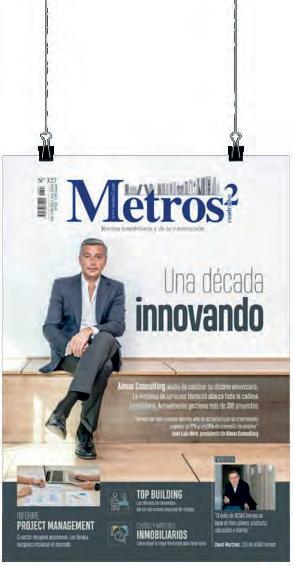

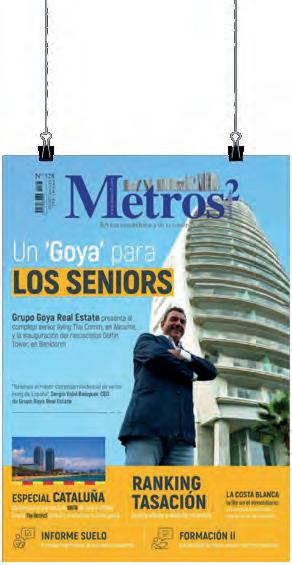



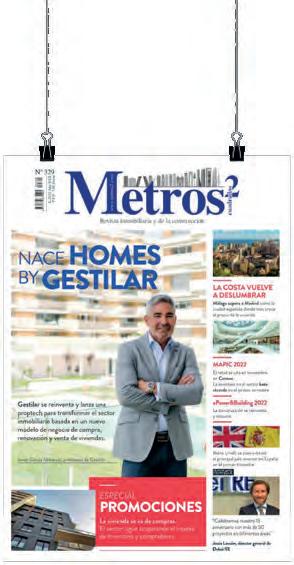

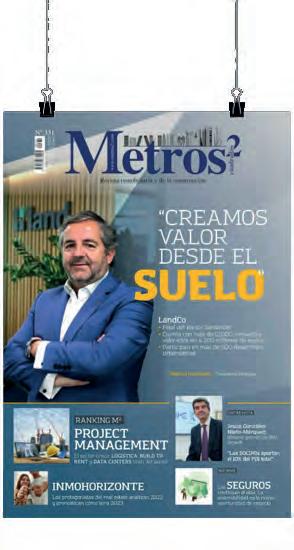


MILAN has “come back stronger” from the pandemic, spurred on by an ambitious programme of regeneration projects and major works building prior to it hosting the Winter Olympic Games, according to the head of the city’s promotional agency.
Milano & Partners general manager Luca Martinazzoli is representing Milan at MIPIM, as part of the wider Italian delegation. Citing over 100 regeneration projects currently under way in Milan, he said that the city was undergoing a remarkable transformation, dispelling many of the fears that he and others had about the damaging consequences of lockdown.
Martinazzoli said Milan’s recov-
ery was partly down to its strong sense of community, which he described as “inclusive and supportive”, and partly because of the city’s strong pull for global capital. “We are the target for global investors right now,” he added.
“We have been offering strong returns to investors. We have 100 regeneration projects currently in Milan and 85% of those are funded by private investors.”
He added: “Milan is moving from being a city that is very much focused on the centre to being a more polycentric city.”

In 2026, Milan will host the Winter Olympics, which has resulted in a raft of developments. These include the centrepiece
Milano Cortina Olympic Village, which has been designed to be transformed into a new neighbourhood in the Porta Romana district after the games. Milan has a high proportion of students, many of whom are studying fashion, which Martinazzoli said was also a big driver of change and development. Out of a population of some 1.4 million people, around 220,000 students across numerous universities and colleges call the city home. Among the many projects under way across Milan is the revitalisation of the Porta Nuova district, who won the Best Urban Regeneration Project category at the MIPIM Awards 2018.
MARSEILLE is looking to capitalise on its new status as European Capital of Innovation, which it secured in December last year in Brussels, according to Nicolas Regrigny, managing director, economic attractiveness and international promotion, at Aix
Marseille Provence Metropole. Regrigny said that Marseille’s Capital of Innovation status represents a major opportunity for the city and the surrounding area. He added that the authority would interpret ‘innovation’ in a multitude of ways:

“We’re going to be working on the specific topic of innovation throughout various fields of intervention, such as industry and digital but also social innovation. We’re an international city with the largest harbour in France, so we have a lot of
communities coming from all over. We’re working on that as a source of innovation, which will enable us to improve our economy and be more effective.”
From a built-environment perspective, Regrigny said that Marseille would act as a “laboratory” for how Mediterranean cities could respond to global warming. “We believe that our city can set an example for what’s going to happen in the coming years,” he added. “We’ve been working on a cooling system for a couple of years, which pumps seawater from 20to 25-metres deep and pushes this water inside buildings to refresh and lower temperatures, rather than using regular air conditioning. In the central business district in Marseilles, buildings are already being refreshed by this system.”
He added: “This is an example of what could be applied in other major cities around the Mediterranean in the coming years and maybe later in northern cities as well.”


“THE OFFICES of the future will be very different,” said Sam Pickering, executive director, head of sustainability at Incendium Consulting, as he explained that in tackling sustainability occupiers needed to understand that the approach to the market will be defined by the fact there is “too much office space”. Speaking at a packed Accelerating The Progress To A Net Zero
Future session on the first day of MIPIM, panellists addressed the challenges of sustainability from a number of different points of view.
Katarzyna Gruszecka-Spychała, Gdynia Deputy Mayor, said that in trying to be more sustainable as a Polish city, any local authority approach had to be adaptable and involve collaboration with
all the stakeholders in real estate. “Those collaborations, quite frankly, also need to be very honest and open,” she said. “But it’s a race. It can’t wait.”
Meanwhile, Sara Jane Viereck, vice-president, ESG, Europe, at logistics specialist Prologis, pointed to the company’s extensive addition of PVs to its distribution centres as it moves towards its target of becoming carbon neutral by 2025. The company is one of the largest solar generators globally, supplying 400GW annually.
“Retrofit is at the heart of progress to net zero,” she said. “What we need is transparency in the market in terms of value. Is there a green premium?”
Meanwhile ULI CEO Lisette van Doorn said that the organisation was seeing a “change in the conversation” around sustainability when discussing the issues with cities around the world and added that at city level “the focus is definitely on retrofit, cities are really trying to push the agenda”.
THE PRICING corrections that started last year still have some way to go in many European markets, according to Rob Wilkinson, chief executive officer, AEW. Wilkinson contrasted many markets in the EU with the UK, which he said had seen rapid adjustments across multiple sectors. “If you take the UK market, in the last four or five months the market really fell by about 20%,” he said. “It was a very quick adjustment because it’s probably one of the markets with the highest volume of transactions.”
The same, Wilkinson added, cannot be said for France or Germany.
“We saw much less of an impact in France and Germany, but eventually [the correction] does catch up
and those markets need to adjust.” However, Wilkinson predicts that European markets will catch up soon, something that would then spark an increase in deal activity. “I think it’s going to happen in Q2 and we’re almost there now,” he said, adding: “We have been investing throughout this period where we can take advantage of some of the changes that we’ve seen in pricing. But it was not surprising that the first few months of this year were reasonably quiet.
“I think probably during Q2 you’ll see some further valuation detections in European markets and as investors’ portfolios do slowly reprice you will see an increase in activity.”
THE POLISH warehouse market could almost double by 2030 from 23 million sq m to 40 million sq m, according to Adrian Biesaga, co-founder of Warsaw-based Lcube. “With high rents and low construction costs, this is a very good moment to invest,” he said.

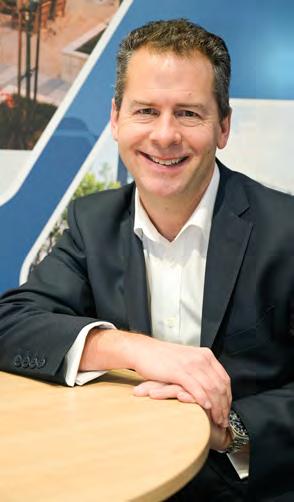
Biesaga describes the company he founded in late 2020 with Michal Stachura as a “garage startup”. It now has warehouses around Poland, in Warsaw, Rzeszow, Wroclaw, Szczecin, and Poznan, with sites planned in Krakow and Katowice.
One advantage of being a recent startup is that the company has operated to high ESG sustainability standards from the start. As a MIPIM debutant, he hoped that this would be a key factor in attracting investment to the company to continue its expansion. It also means that Lcube has been ahead of the curve in installing solar panels to offset the energy price. The company is now considering using heat pumps, he added.


Disponible aussi sur l’app store


sur www.decisionsdurables.com
Nouveaux business, RSE, modèles économiques innovants : Décisions durables vous accompagne pour prendre les bonnes décisions. Suivez-nous aussi sur :

1930-2023
1940-2023
THE MIPIM community is this week mourning the loss of A Eugene Kohn, the pioneering architect who co-founded Kohn Pedersen Fox Associates (KPF) in 1976, along with partners William Pedersen and Sheldon Fox. One of the first architects to exhibit at MIPIM, Kohn is remembered as great communicator, dedicated team player and committed mentor. Under his leadership, KPF became a major rival to leading international architecture firms. The company enjoyed particular success designing skyscrapers, with the World Financial Center in Shanghai, headquarters for Unilever and Amazon in London and the World Bank HQ in Washington among its 250-plus projects to date. In a career punctuated with awards and accolades, highlights included The National Building
Museum Chairman’s Award and The Skyscraper Museum Award. Kohn was respected for his inspirational leadership qualities. He organised KPF as a collaborative collection of mutually supportive colleagues, all dedicated to excellence in design. He was also in demand as a moderator, juror and keynote speaker on contemporary architecture. He lectured at top-tier universities and professional organisations and institutions across the US and around the world.
A keen watercolourist, Kohn was also a pragmatist. His skill in understanding the relationship between architecture and commerce allowed him to find creative solutions and build consensus between designers and developers. With characteristic optimism, diplomacy and good will, he changed many of the world’s great cities.
FRENCH architect and political activist Roland Castro, aged 82, has died “peacefully, surrounded by his family, in a Parisian hospital”, his daughter Elisabeth Castro has announced.

Castro made his name through designs predicated on raising standards of living for working-class neighbourhoods. Indeed, he was a colourful figure of French intellectualism, donning a trademark pinstripe suit and socialising with Jean-Paul Sartre and Jacques Lacan, as well as meeting Che Guevera and Fidel Castro.
Born in Limoges in 1940, Castro’s Jewish heritage meant he spent the first years of his life in hiding with his parents and sister. His ambitions took him to the Paris Beaux-Arts architecture school in 1958, where he joined the Union of Communist Students only to be expelled in 1965 for criticising Stalinism. Instead, he embraced Maoism and became
a leading figure in the French anti-capitalism protests in May 1968. Two of his best-known projects were the renovation of Cité de la bande dessinée in Angoulême in 1990, and the Bourse du Travail in Saint-Denis, Paris in 1983.
Professionally, he was most recently involved in the current redevelopment programme to restore Cannes’ La Croisette seafront promenade, in a collaboration with Snøhetta, WSP, Observatoire International, JML Water Feature Design, Manifesto, Transitec and Cronos Conseil.
On his death President Emmanuel Macron wrote on Twitter: “Legend of architecture and urbanism, visionary left-wing activist, Roland Castro has left us. On our urban landscape, it bequeaths an indelible imprint. To the citizens, an inspiration. Goodbye and thank you, Roland.”
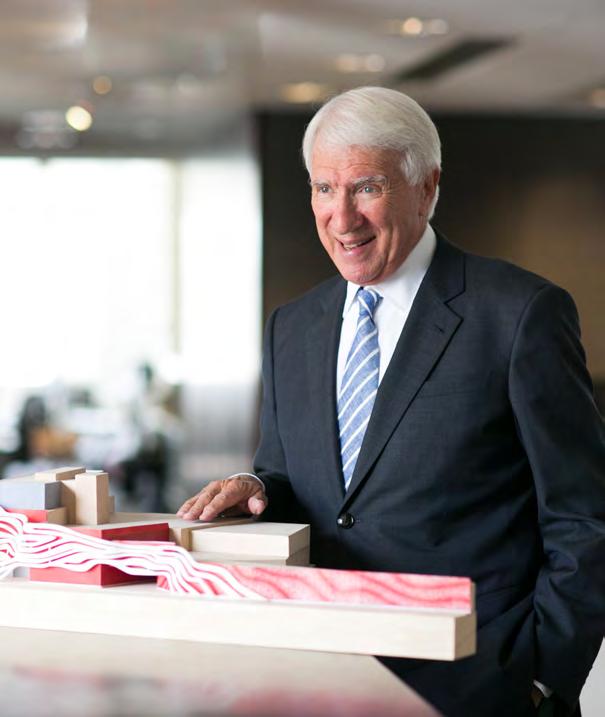
11.00 - 12.00
Building Tomorrow Stage - Propel Area (P-1)
Fishbowl - Time to scale: How can we encourage the scaling up of promising solutions?
09.30 - 10.15
Accelerating net zero buildings and sustainable Neighbourhoods
Organised by
10.00 - 10.45
Measuring Impact: how to measure, report and embed ESG into your operations
10.00 - 10.45
Cultural Infrastructure: Why do we need it?
09.45 - 10.45
How to establish a fair and just net zero transition?
Sponsored by
10.30 - 13.00
The Offices Workshop
10.45 - 11.15
The role of sport investment in real estate development
11.30 - 12.15
From CSR to Creation of Shared Value: Businesses’ role in driving social and environmental agenda
11.30 - 12.30
Building investment leadership for change
10.00 - 11.00
The Barcelona Green Deal: New investment opportunities
Sponsored by
12.00 - 14.45
Building territories of the future
Sponsored by
Organised by
1. Only MIPIM team can issue invitations to this event | Sessions with a frame are the outstanding sessions
14.15 - 14.45
UK: Latest on levelling up, real estate and infrastructure investment opportunities

14.00 - 17.00
The Hospitality Workshop
14.00 - 14.45
Data centres: How can they be more sustainable in construction?
14.00 - 14.45
Net zero and then?
Sponsored by Sponsored by
12.00 - 14.45
Building territories of the future
Organised by
15.30 - 16.30
Gold sponsor
Silver sponsor
Knowledge partner

15.45 - 16.45
The Path to Net-Zero Buildings
Organised by
15.45 - 16.45
Current status and challenges of the ESG transformation
Organised by
Future ready high rise, a new deal for sustainability and attractiveness
Organised by
1. Only MIPIM team can issue invitations to this event | Sessions with a frame are the outstanding sessions
14.00 - 16.00
The Credit Perspective 2023 and Beyond
12.30 - 14.00
Sponsored by PARTNER STAGE
Verrière Californie (P5)
CLOSED-DOOR EVENT by invitation only1
18.30 - 19.30

13.00 - 13.45
Using proptech to explore and improve the most interesting, impactful and profitable issues in our sector
13.00 - 13.30
“Grand Paris: The territory of innovation” Part 2
Organised by
13.45 - 14.45
Serviced-based urban logistics: potential solutions
Organised by
14.30 - 17.00
Nordics: Challenges, Opportunities, Strategies
14.00 - 14.45
How can retrofitting ensure the avoidance of stranded assets?
Sponsored by
15.00 - 15.45
The next generation’s ambitions
14.00 - 14.30
EG Interview: UK Political environment
14.30 - 15.15
Resilient London: Economic recovery and transformation
15.30 - 16.30
La construction bas carbone par WO2 Conference in French without translation
Organised by
17.00 - 18.30
Brazilian real estate market: Trends and sustainable projects
17.15 - 18.15
The new Croisette: Creating coastline thresholds
Organised by
Organised by
15.30 - 16.00
MIPIM 2023 highlights – drinks reception
14.00 - 14.30
Olympic Games 2024, a major catalyst for the Region’s transformation
14.30 - 15.00
When heritage rhymes with innovation!
15.00 - 15.30
It’s not just about data. It’s about data quality
15.30 - 16.00
Urban recycling, creator of ecological and real estate value
16.00 - 16.30
Real estate investments: new criteria to meet environmental challenges
16.30 - 17.00
Urban logistics at the heart of metropolitan issues
14.45 - 15.30
Invest La Défense 2050
Conference organized by Groupama Immobilier
Sessions with the mention “organised by” are not official conferences organised by MIPIM. Sessions in blue are Geo Focus sessions



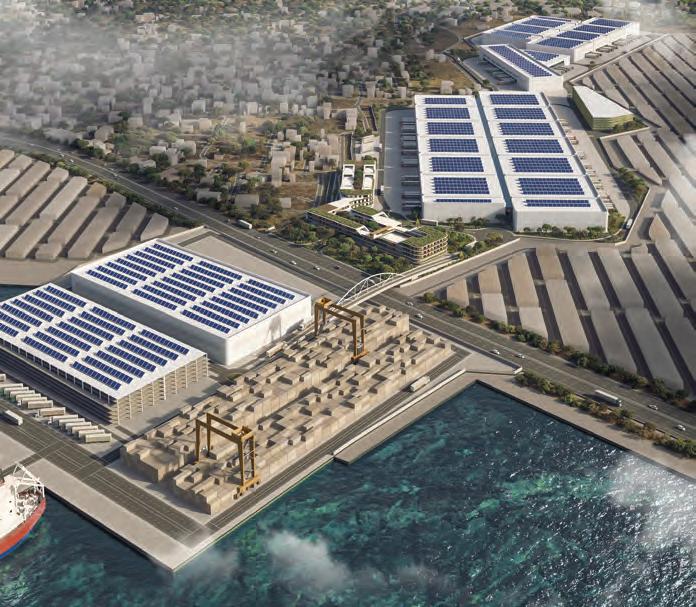






THE PUBLIC planning body
EPA Paris-Saclay will reveal details at MIPIM today of five consultations for housing programmes soon to be launched as part of the development of the
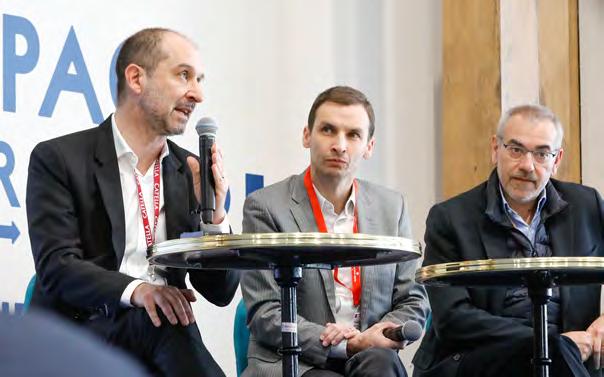

Urban Campus and Satory districts of Versailles.
The consultations will cover about 1,000 new units, including nearly 300 family housing units in the Satory and Lisiere
districts; around 500 family housing units in Corbeville; and 160 housing units and a creche in the Ecole Polytechnique district.
Benoit Lebeau, director of development at EPA Paris-Saclay, said the project was moving forward at pace. “The first stage has ended. And we are on the map of the big innovation clusters,” he said. The area encompasses 20% of French scientific research.
Lebeau said 30,000 students were now on campus at the French universities within the Paris-Saclay development, joined by large companies including EDF and IBM. Family housing is a key part of the next stage of development.
More than 600 houses already have building permits. “What we want is not to be dependent on the urban centre. We want to have neighbourhoods where it’s attractive to live, so we wanted to create the jobs first, and now the housing will come,” Lebeau said. EPA Paris-Saclay hopes to attract more companies. “We want to attract new research and development companies and to maintain new startups,” Jérémy Hervé, innovation and economic development director at EPA Paris-Saclay, said. Laurent Lavergne, global head of asset management, AXA IM - Real Assets, which has invested in the area, said: “When you look at the map of Europe and where the research and development hubs are, then Paris-Saclay is one where there is a definite need for real estate and support. It’s an international hub, not only a French one.”
Save the date: 22 June 2023 8.00 am - 2.30 pm
After the success of their special issue “FDI screening in France”
Marina Guérassimova (Chief editor, Fusions & Acquisitions)

David Chekroun (Professor, ESCP Business School)

Pascal Dupeyrat (Foreign investment strategist, Relians)
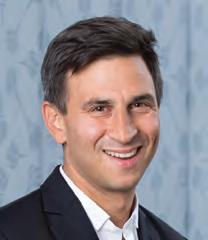
are pleased to invite you at the Maison de la Chimie
28 Rue Saint-Dominique, 75007 Paris, France
PROGRAM DETAILS
n Regulators' plenary conference (USA, France, Germany, UK, EU ...)
n 6 round table discussions (including the Real Estate topic)
n Networking
For further information and registration details, please contact us : Fusions & Acquisitions Magazine - Publisher Dealflow-Data
19, Parc Vatonne, 91190 Gif-sur-Yvette, France, + 33 (0)1 69 31 07 23 contact@fusions-acquisitions.fr
www.fusions-acquisitions.fr

https://www.linkedin.com/company/fusions-&-acquisitions-magazine

TALLINN, the picturesque capital city of Estonia often referenced as part of a tri-nation Baltic States offering, is at MIPIM to set out its own unique agenda —built around strong sustainability credentials and a hi-tech economy.

Jaanus Vahesalu, head of the business centre at Tallinn’s city enterprise department said: “We’re here to promote Tallinn’s strengths as a location. The tech sector is booming and we are European Green Capital 2023. We are also currently number seven in the Future rankings of European mid-sized cities, so we have a very positive story to tell investors.”
Vahesalu said the city has two key priorities in Cannes: “The first is

076_MARSEILLE_N1a2_PIM
about our talent. We have nine companies here as part of our delegation. They are out looking for business across areas such as real estate development, water purification, AI and lock systems
for self-service smart hotels. The second is about our digital lifestyle. Some people know us for our ancient architecture, but this is a city of self-driving buses and delivery robots. We want foreign
investors who are interested in any tech innovation to take part in our smart city activities.” One interesting development, Vahesalu said, is the launch of a programme called Test in Tallinn. “The aim is to invite companies to test their products in Tallinn. There’s no money involved, but it’s a chance to test prototypse in a positive and innovative environment.”
Tallinn is primarily talking to European investors, said Vahesalu, with countries like France, Spain and Portugal seen as key targets. “But we did also have a meeting at MIPIM with a Malaysian delegation interested in our state-ofthe-art e-government solutions.” There are no major infrastructure investments in the city at present, he said, “but tram lines are currently been built to unite the airport, seaport and city centre”. There is also a masterplan for the development of the Port of Tallinn’s old city harbour.
Mit den kostenlosen Newslettern vom immobilienmanager haben Sie alle Themen der Branche im Blick – einfach und bequem per Mail.














Redaktionsletter:



News zu Branchentrends und aktuellen Themen aus der Immobilienwirtschaft sowie exklusive Inhalte aus unserem Magazin.









Themenletter:
Tiefergehende Informationen zu Themenwelten wie z.B. Nachhaltigkeit & ESG, Digitalisierung oder Projekten.





Jetzt anmelden unter www.immobilienmanager.de/newsletter
Infoletter:
Informationen zu exklusiven Fachveranstaltungen, Sonderheften zu Spezialthemen sowie weiteren relevanten Produkten für die Immobilienbrache.
RM Rudolf MüllerTHE POPULATION of Lithuanian capital Vilnius is expanding rapidly and the focus for the local development authority is to try and encourage new office, residential and retail facilities to be built on brownfield sites, rather than expanding the footprint of the city. Among a 40-strong official delegation at MIPIM, Tautvydas Tamulevicius, head of business at Go Vilnius, said that, with a 5% increase in population in 2022 and an expectation that the city will grow to around 840,000 people by 2030, re-use of territory had become a key priority.
“Vilnius is 700-years-old this year and we have potential projects across the city and have welcomed many new businesses, especially from Scandinavia,” he
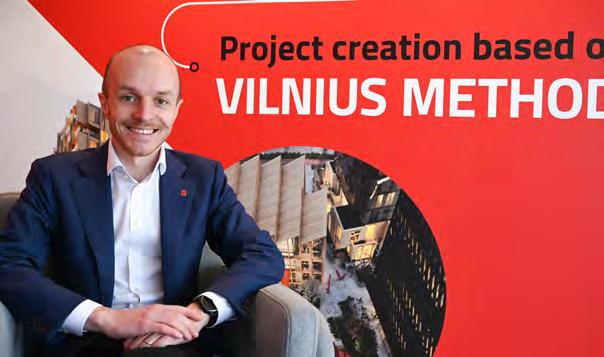
069_RLI_N_PIM.pdf
said. “Huge areas of the city are ready for transformation and revitalisation, including both private and public schemes.”
Pointing to the city’s youthful population and the increasing levels of investment targeting Vilnius, Tam-
ulevicius said that Vilnius offered significant opportunities across all asset classes. It has also developed a strong reputation for innovation, as exemplified by a current project that will see all street lamps converted to EV charging points.
City architect Mindaugas Pakalnis said that Vilnius is still in the process of modernising its real estate stock in the post-Soviet era and that much of its residential stock is outdated and in need of redevelopment.
“The amount of residential space for the existing population is very low, even before you consider population growth,” Pakalnis added.
“Similarly, the amount of commercial space and retail space per head is well below levels that exist in Western Europe. So, we are really expanding across all asset classes.”
Pakalnis said that during the Soviet era Vilnius had been developed as an industrial hub. The city authorities are now working hard to reposition it as a services and commercial centre. “The politicians have understood that the priority is not to grow the size of the city and disturb the natural environment around the urban land, but rather to develop and regenerate the existing real estate,” he said.


THIS is the first MIPIM since London real estate expert Fergus Keane took over as head of BNP Paribas Real Estate’s Central London Investment Team.
And his unequivocal message to delegates is that “now is a great time to buy London”.
Keane, who has transacted more than £10bn during his career,
told MIPIM News: “London experienced a rapid correction last year driven by the debt markets, which created liquidity issues. Then Liz Truss’ interventions accelerated everything. Now, my view is that the market has stabilised and people have a sense that they can look down the road with some certainty. So I think we’re at the bottom of the market — and I certainly have the feeling that global investors want a London conversation.”
Keane, who was previously at Cushman & Wakefield, said he is excited by the chance to transform BNP Paribas Real Estate into “a real force in London, just as in Paris and Frank-

furt. BNP is a huge banking group, so their knowledge of clients and connections is unparalleled. I think those banking credentials are an advantage because they give us a unique perspective on the sector.”
Keane said he is principally interested in London office, but he also has a wealth of experience in retail: “I’ve done a lot of business around Oxford Street, Regent Street, Bond Street and the Kings Road. Bond Street is in fantastic health and I have a lot of conviction around Oxford Street, which has seen several refurbishments.”
At MIPIM, his top priority is “networking with clients. And deal-making gets done here. You can get two people in a room and help them reach an agreement in a way that isn’t always possible if you’re in London and they are in different geographies”.


The first ever MIPIM NY launches in November 2023, and this empowering event promises to be an essential date in the diary for globally-minded real estate professionals looking to get ahead
IF NEW YORK is the world’s melting pot, what better place to discuss the evolution of the built environment and real estate’s exciting future? In fact, MIPIM NY — a brand new event in the global real estate calendar — will be coming to the Big Apple on November 29 and 30, 2023 with this very purpose.
Organised in partnership with MetaProp and conceived as an exhibition connecting the players interested in driving a more sustainable, user-centric and profitable future for real estate, MIPIM NY will serve a local, national and

international purpose, as Lauriane Halle, director of MIPIM NY, explains.

“MIPIM NY is an event focused on New York first, and at the same time tackling huge, transversal themes in real estate,” Halle says. “Topics from retrofitting to climate change and the decarbonisation of the built environment affect the entire industry worldwide, so we’re expecting lots of international interest too.” Halle adds: “Just as visitors from all over the world fly into Cannes every March for MIPIM to get closer to European real es -
tate markets, we expect delegations from Europe, Asia and the MENA region at MIPIM NY. Cross-border themes have never been more relevant, and MIPIM NY will offer access to the game changers in real estate who are already walking the walk.”
While global consumers look to New York for style predictions, economists and analysts often chart macro-economic currents and investment trends which originate in the US before impacting the rest of the world.
“MIPIM NY will be about first-mover advantage,” Halle says. “Furthermore, there is huge, global investor interest in the US market right now as its real estate markets look so resilient even in the face of economic headwinds. Many global investors would like to diversify there further, and
this will be an opportunity to get the inside track.”
Indeed, the country’s vast opportunities are increasingly drawing investors from even further afield, as global funds reduce their exposure to Europe’s more challenging scenarios and seek security in the US’ resilient metrics and strong legal and regulatory frameworks. Furthermore, experts believe that the global flood of capital to US real estate is a trend which is only going to ramp up in the coming decades. The evolution of certain niches such as life sciences, data centres
ference, MIPIM NY will bring together owners and occupiers, developers, investors, public authorities, tech companies and many more interested parties. The event will offer networking, exhibition areas, and in-depth conversations about the factors raising the stakes in the built environment.
and even multifamily has often been witnessed in the US before reaching European or Asian shores. For this, and other reasons, US commercial real estate trends are now required reading for investors around the world. In line with this, MIPIM NY will involve tailored learning expeditions to New York City neighbourhoods and landmarks, as well hosting the RE-Invest closed-door summit to debate the most challenging issues of the day. MIPIM NY will also have its very own MIPIM Awards, celebrating the industry’s most sustainable and visionary projects. Excitingly, the Awards countdown will begin in April when more information will be revealed about the categories, which will be custom-made for New York and North America. The jury onboarding meanwhile will happen in June, while the jury meeting to deliberate a shortlist is scheduled for September. As both an exhibition and con-
One theme that will be of huge importance at MIPIM NY will be the Road to Zero, a major part of this year’s MIPIM which will continue like a “red thread” through MIPIM NY’s panels and discussions, Halle says. The tone of the event will be about empowering change, from exploring the potential of the low-carbon economy, to data ethics and the continuing evolution of the workplace-as-a-service. Another equally important track will be innovation in all its guises. Halle prefers the term “innovation” to “property tech” or “digitalisation”, because, as she points out, real estate’s virtuous evolution isn’t merely tied to building software. “It’s about people and ideas, but also very concrete drivers of social and environmental change, all of which come from many different facets of the industry. The vast strides taken in the world of construction tech, fintech, greentech and cleantech are all having an impact on real estate; innovation comes too from city and corporate ecosystems and visionary public authorities, as well as landmark commitments to make real estate more diverse and equitable.”
Unsurprisingly, MIPIM NY will be the flagship event of NY Real Estate Tech Week, organised in partnership with Metaprop and continuing the expansion of the MIPIM brand across the Atlantic, reinforcing the solid reputation it has built in New York in recent years for creating crucibles of change.
Big-name partners including the Urban Land Institute (ULI) have already pledged to back the event, which will take place at the centrally located Javits Center. Although the space isn’t quite as
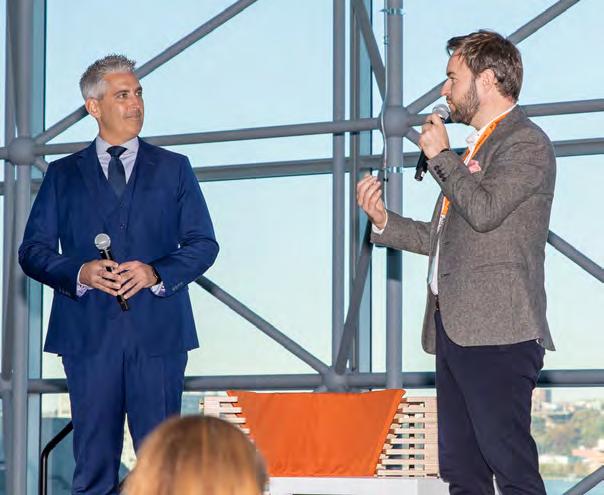
vast as the Palais des Festivals in Cannes, Halle is excited about the potential for MIPIM NY. “New York is perhaps the most important city in the world for tech and innovation,” she says. “No matter where you are on the real estate journey, or your place in the property cycle, this will be an opportunity to learn, share, connect and grow.” And it sounds like participants should think about adding MIPIM NY to their schedule while also maintaining their annual trip to Cannes.
“Both the Cannes and New York events will be highly complementary: a chance to carry on conversations you are having in Cannes and check in again midway through the year,” Halle says. “While MIPIM in Cannes is known for guiding and influencing the built urban landscape, MIPIM NY will be about empowering the real estate community for change.”
She concludes: “With economic markers suggesting a global uplift arriving in 2024, the timing of MIPIM NY will be crucial to strategise your year ahead.”
“Cross-border themes have never been more relevant, and MIPIM NY will offer access to the game changers in real estate who are already walking the walk”
Lauriane HalleMIPIM NY will take place November 29-30 at the Javits Center in New York MIPIM’s Nicolas Kozubek (right) chats to MetaProp’s Aaron Block on the stage of the Javits Center in New York























